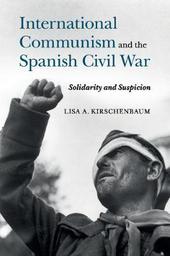
|
International Communism and the Spanish Civil War: Solidarity and Suspicion
Paperback / softback
Main Details
| Title |
International Communism and the Spanish Civil War: Solidarity and Suspicion
|
| Authors and Contributors |
By (author) Lisa A. Kirschenbaum
|
| Physical Properties |
| Format:Paperback / softback | | Pages:292 | | Dimensions(mm): Height 230,Width 152 |
|
| ISBN/Barcode |
9781107514058
|
| Classifications | Dewey:946.081 |
|---|
| Audience | | Professional & Vocational | |
|---|
| Illustrations |
10 Halftones, unspecified; 10 Halftones, black and white
|
|
Publishing Details |
| Publisher |
Cambridge University Press
|
| Imprint |
Cambridge University Press
|
| Publication Date |
25 January 2018 |
| Publication Country |
United Kingdom
|
Description
International Communism and the Spanish Civil War provides an intimate picture of international communism in the Stalin era. Exploring the transnational exchanges that occurred in Soviet-structured spaces - from clandestine schools for training international revolutionaries in Moscow to the International Brigades in Spain - the book uncovers complex webs of interaction, at once personal and political, that linked international communists to one another and the Soviet Union. The Spanish Civil War, which coincided with the great purges in the Soviet Union, stands at the center of this grassroots history. For many international communists, the war came to define both their life histories and political commitments. In telling their individual stories, the book calls attention to a central paradox of Stalinism - the simultaneous celebration and suspicion of transnational interactions - and illuminates the appeal of a cause that promised solidarity even as it practiced terror.
Author Biography
Lisa A. Kirschenbaum is a Professor of History at West Chester University, Pennsylvania. She is the author of The Legacy of the Siege of Leningrad, 1941-1995: Myth, Memories, and Monuments (2006) and Small Comrades: Revolutionizing Childhood in Soviet Russia, 1917-1932 (2001). She is the recipient of a fellowship from the National Endowment for the Humanities and grants from the Kennan Institute for Advanced Russian Studies of the Woodrow Wilson Center and the International Research and Exchanges Board. She has published articles in the Slavic Review, European History Quarterly and Nationalities Papers, and has contributed to the Women's Review of Books.
Reviews'Lisa A. Kirschenbaum offers an important contribution to Spanish Civil War studies, linking the 1930s with the Cold War era. Well-written and well-researched, her book illuminates both personal and political issues that shaped participants through their lives.' Peter N. Carroll, Stanford University, California and author of From Guernica to Human Rights: Essays on the Spanish Civil War 'Kirschenbaum's International Communism and the Spanish Civil War offers a welcome, fresh approach to looking at the Spanish Civil War. Rather than taking one of the two standard and highly polarized positions on the role of the communists, she adopts a more neutral stance and seeks to convey what the experience was like for the committed internationalist, basing much of her text on diaries, letters, and archival materials produced by the actual participants. She also puts the war into a broader perspective within the international communist movement, looking at key institutions, networks, and attitudes from before the war and also covering the decades since the Republican cause was lost in 1939, so that the book is really a history of the international communist movement told from the perspective of the civil war in Spain. It is well documented and highly readable.' Katerina Clark, Yale University, Connecticut 'A dazzling, deeply informed, and spiritedly composed sociocultural history of international communism, taking as its principal case study the mobilization of communists around the Spanish Civil War, Kirshenbaum's new book puts a human face on interwar communism and explores the daily life, interpersonal relationships, triumphs, and tragedies of individual communists, committed to the cause. ... Through impressively deep research in unexplored archives, Kirshenbaum argues that the Comintern was much more than a series of decisions dictated from Moscow; it was people, relationships, and adventures. It had a soundtrack, too, and that was the raised, optimistic, voices of tens of thousands, singing the same song in many languages, first in Moscow and then in Spain. ... The topic and approach of this unique, beautifully written volume will recommend it to college courses covering the Spanish Civil War, international communism, interwar Europe, the European civil wars (1914-45), and twentieth-century Europe.' Danny Kowalsky, Queen's University Belfast '... this book is an impressive piece of scholarship which reflects both the author's command of innovative investigative methods as well as her profound knowledge of the Stalinist era. As such, it is a book that should not be overlooked by anyone interested in Spain's war and its place in the history of international communism.' George Esenwein, The Russian Review 'Kirschenbaum opts for an intelligent balance between description and analysis in her work. She shows that the history of communist internationalism is more than just the history of the leading elites. It is the history of a vital base, intimate and individualized, in which personal letters, poems and other series of personal productions during the war became solid primary sources for the reconstruction of another of the trajectories of the communist movement.' Josep Puigsech Farras, European History Quarterly 'With its cultural and biographical approach, the book goes beyond the still polarized historiography of the Spanish Civil War, offering instead a fascinating, intimate picture of how it felt to be a communist in a context full of contradictions and conflicts. Political commitment was never just ideological, it was profoundly tied to personal experiences and self-identity.' Brigitte Studer, Slavic Review '... a valuable contribution.' Laurie Cohen, Jahrbucher fur Geschichte Osteuropas 'This study should certainly be read by historians of the Spanish Civil War; as well as by scholars of antifacism and Stalinism. More importantly, it should be considered by those studying the Comintern, especially with regard to transnationalism.' Oleksa Drachewych, Europe-Asia Studies
|